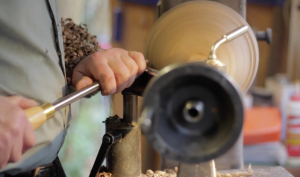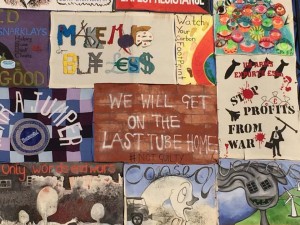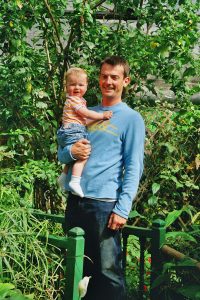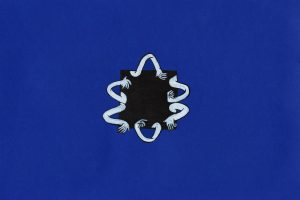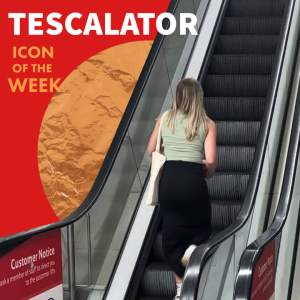Autism and ADHD: Sex, Drinking, and Self-Diagnosis
by Bella Gerber-Johnstone | February 29, 2024
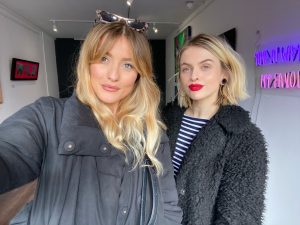
TW: Mentions of alcohol abuse and sexual assault.
Charlotte Mia and Jess Joy are a modern-day platonic love story. They first gravitated towards each other during Freshers’ Week at Plymouth University 11 years ago, and from that moment onwards, have braved the rollercoaster of life hand-in-hand. When the lows got stomach-droppingly low, and Mia turned to her Head of Course for help, she was simply told: “if you carry on the way you’re going, you’ll end up stacking shelves in Tesco”. A year after that ominous remark, Mia dropped out of university, filled with shame, and ridden with debt.
A decade later and both are late diagnosed with autism and ADHD, and Jess and Mia are, in fact, stacking shelves. Shelves of all good bookstores, that is – with their brand-new book, How Not to Fit In (out 15th February), self-described as a ‘handbook-meets-rallying cry’, and an ‘unapologetic guide to navigating autism and ADHD’. The book brings together contributions from dozens of experts and people with real experiences, giving guidance on how to navigate ‘relationships, careers, friendships, and finances’ if you are neurodivergent. Mia and Jess are also co-founders of the online platform and community @IAmPayingAttention (which has a fast-growing 100k followers).
I know what you’re thinking: it’s not often you hear of friends made during Freshers’ Week still glued together at the hip a decade later, but these two make for a lovely exception. Embrace it. Now, I’m still recovering from freshers’ week myself (yes, half a year later), and I’m curious about whether Mia and Jess think their diagnoses have helped them look back on their bumpy ride with more clarity. Jess groans and tells me that “without really knowing it, I think we were probably quite vulnerable”. She recognises that both her and Mia were “just really desperate to fit in” (cue the rather aptly named book title).
Looking back, Mia describes Freshers’ Week as “forced socialisation… there’s no other environment in the world where you’d – in one week – be forced into making all of these friends”. Small things like not wanting to go clubbing were teased by others, deemed uncool: Jess tells me “I got taken the piss out of, referred to as grumpy”. Now Jess recognises that she was overstimulated when she went clubbing and didn’t have the words to describe it– “spots that students tend to frequent are very loud. They are full of people. When I think about it now, that is literally my idea of hell”. Mia laughs, agrees compassionately, and tells me that when they did go out-out, the pair stuck to the quieter smoking areas, and opted for “evenings spent in places that were a little bit grungier with music that was more our vibe” instead. Jess recognises that they both had “all of this internalised shame about not being enough and this desperate need to be good enough”.
Jess and Mia coped as many freshers do, turning to booze. In the middle of all the people-meeting mania, the pressure to meet an entire group of perfect friends who walk the line of cool and kind just right, Jess felt like there wasn’t “really any room to decompress”. And so, as she put it, “alcohol… numbs it a bit”. She acknowledges this delicately: “we’ve definitely both navigated our struggles with alcohol”. In fact, Mia recently wrote an article for The Times on her “excessive drinking and sex life at uni”.
To many, autism is often presented in TV shows or the media as solely the white-guy-who’s-great-at-maths (you know him, the Sheldon from Big Bang Theory type), leaving autistic women and higher-masking autistic people behind. Hearing the story of two women drinking heavily in intense social settings, masking on the outside, but exhausted on the inside, is difficult to hear, but refreshing. Mia’s really candid about her tumultuous relationship to alcohol: “I used alcohol not only to numb [myself], but to bring myself up to a level where I was able to perform socially, the same as everybody else. It gave me confidence… it made me think less about whether I was fitting in, and less aware of my surroundings”. Jess points out that “for a lot of people who are high-masking autistics… a lot of us don’t even realise for a long time that we are autistic because we think, ‘Oh, no, I know how to do body language and I know all of this stuff, and actually, it’s because we’ve been studying it for a really long time’”.
Jess admits “it was definitely the same with weed as well”. How does neurodivergence play into alcohol and drug abuse? It’s tricky territory, but Mia explains what she feels to be the link between their autism diagnoses and drinking: “I think, as [neurodivergent] people, we think so much into everything. And often, a drink or something else can relax you to a level where you’re not having as many thoughts. Even though, obviously, it’s not actual relaxation, it’s just numbing.” But, she admits, “it gives you the feeling of being relaxed, so that you’re able to actually enjoy what you feel you should”.
The University Experience™, we’re told, is supposed to be both adventurous and sexy. (Instead, we end up relentlessly essay-crisising and sleeping with one person… but I digress). As with any good chat, it’s time to talk sex. Mia tells me that “being Autistic-ADHD, I find I’ve gone into a relationship with this excitement, but quite often I find myself a few months into a relationship being like, oh my god. Like, either I was expecting too much stimulation from them, or perhaps they didn’t think the same way I did”. Mia goes on to say: “It took me quite a while to figure out [that] I shouldn’t expect someone that I’m in a relationship with to literally stimulate me all the time. I should know how to do it myself. But also, I’ve been in relationships with people that don’t see the world the way I do, and it’s so lonely”.
On this topic, Jess agrees: “I think as autistic people, we think very deeply… You know, we just love to tear something apart and really understand the details and the why. There are a lot of people whose brains just don’t really work that way”. Mia jumps back in at this point, to add: “you feel quite alone constantly. A lot of the time [that was why] I ended up single. Because when I was actually alone, that was when I felt least alone – I wasn’t trying to connect with someone that I couldn’t connect with”.
It’s often glossed over, but some neurodivergent people have an added layer of vulnerability in sexual settings, particularly missing social cues that someone neurotypical may pick up on. According to the Autism Research Institute, autistic youth are three to four times more likely than non-autistic youth to experience sexual victimisation and between 40% and 50% of autistic adults report experiences of sexual abuse during their childhood and teens. Mia feels like this impacted her in the past: “being autistic, maybe not being able to read things… I don’t like to use the word naivety, but I feel like there’s a perspective of me that I am [naive]”. Jess butts in instantly – “no, you’re not” – and tells Mia “I think sometimes you are incredibly trusting, and that’s a really great quality, but there are some people who unfortunately take advantage of that”.
I feel like I’ve been welcomed into their friendship with open arms: I’m grateful to be part of a chat between old friends. I tell them this and they chuckle – they tell me they’re sitting on a bed in a London hotel, and have lots of time to spare in between book launch events. How glamorous.
Jess and Mia have different diagnosis journeys. Jess obtained a medical diagnosis for her ADHD in 2020, but found the process “absolutely exhausting and draining… there were lots of tears”. Jess pursued her ADHD diagnosis “basically alone” (although, “obviously I had Mia’s support and some of the people around me”) and struggled most with the pile of standardized diagnostic admin she had to work through: she found it “taxing… having to fill out all of these long forms, trying to adequately summarise my experience in the hope of a medical professional justifying my suspicions, but I won”. After a lot of research, Jess came to the conclusion that she was autistic, too. She’s really frustrated by the impact the process had on her – “I think it’s fucking ridiculous, quite frankly, that we have to fill in all of these forms”.
During the pandemic, Mia similarly started to pursue a diagnosis for ADHD via the NHS, but found the process so difficult that she stopped. Mia explains she finds “the diagnosis process in itself, if you are struggling, if you are carrying trauma, if you are disabled… “inaccessible”. She tells me that she got to a point where she questioned the value of a professional diagnosis (a “sheet of paper”, as Jess describes it): “Is it really worth it? What am I going to get out of it?”. Mia’s therapist gave her validation that she had ADHD and autism, but not a clinical diagnosis. ‘Given that there is no autism or ADHD blood test’, as she writes in How Not to Fit In, she decided that a self-diagnosis felt sufficient to capture how she identified.
I ask Jess and Mia about the value of a diagnosis in terms of getting accommodations in an educational environment or the workplace. Jess replies: “We live in a society where unfortunately people aren’t always going to get the support they need unless they have a paper to say, ‘Hey, you need to give me this accommodation’”. Jess recognises that accommodations that could come from a medical diagnosis doesn’t actually prove to be something useful for either of them, “given that we’re currently working for ourselves and able to make our own accommodations – there aren’t really many positives in our position at the moment” but may be useful for others.
I see where they’re coming from, but I’m still skeptical. There is, of course, the fear that people will self-diagnose based on something they saw on, say, TikTok. But Jess tells me she looked into her diagnosis extensively: “I’ve spent hours and hours and hours and hours of my time researching and listening to the experiences of neurodivergent people, particularly autistic people… [and] it just feels like we’ve found so much peace and so much relief from reassessing the standards that we’re holding ourselves to”.
For Jess and Mia, identifying with these diagnoses has helped them, as Jess puts it, “just by changing the expectations of ourselves”. And, as Jess argues, “it feels a little bit unfair that only certain people are allowed access to that peace and relief and validation”. And some doctors aren’t as clued up as they’d like them to be; Mia says “we’ve had so many conversations with people in our community who have told us that they’ve gone to their GP, and their GP [has said] ‘oh, girls can’t have ADHD, adults can’t have that’”. Jess is personally not a fan of the label Autism Spectrum ‘Disorder’: “It feels like this is a part of me… the fact that my brain works this way… I’m not disordered”.
They recognise, too, that they both have a “level of privilege” that others may not have, as two white women. For Jess and Mia, they “go so hard in advocating self-diagnosis because… there are a lot of people in our community who don’t have access, or the resources, to obtain a diagnosis”. Mia is at her most confident when she says, “the reality is, it does come back down to politics”. It’s true: diagnostic processes have been politicised, especially by right-wing media. Last February, a Telegraph article headline read as ‘The ADHD self-diagnosis ‘industry’ offering a quick fix that doesn’t exist’. The general concern is that young people will, en masse, turn to self-diagnosis as a ‘quick fix’, or solution, diluting what it really means to be neurodivergent. But it’s nice to step away from panic-stricken, often unnuanced headlines, and instead hear about the emotional journey of real people self-diagnosing, and the lengthy process Jess and Mia undertook.
As our conversation comes to an end, I feel surprisingly moved. I look down at the brightly coloured hardback on my desk (a gorgeous ombre of bright oranges and pinks, I must say) and pick it up with a newfound understanding. I realise Jess and Mia have shared a lot with me; with you. They’ve told a story of navigating mental health struggles and newfound diagnoses, but the story that strikes me most is the unwavering joy of their friendship. I imagine who will be the Jess to my Mia in a decade’s time, and a smile lingers on my lips.∎
Words by Bella Gerber-Johnstone. Photo courtesy of Charlotte Mia and Jess Joy.
